huber.huber
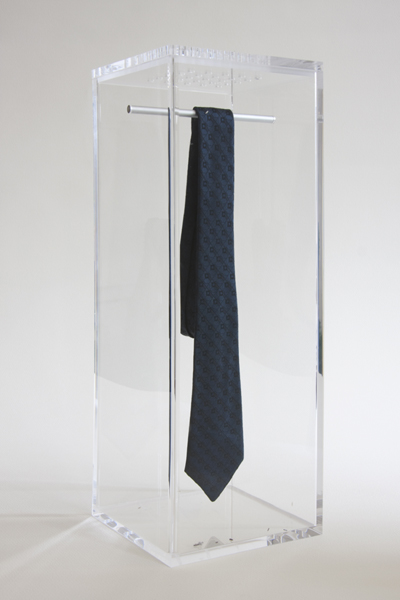
huber.huber: Capitalis l, 2009
Acrylic box, wool tie, moths, 48 x 18 x 18 cm; private collection, Lugano (Switzerland)
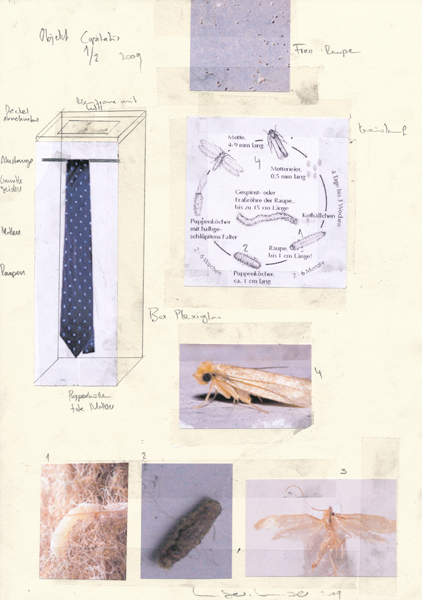
huber.huber: sketch for Capitalis l
The work title "Capitalis l" refers to capitalism, but also to "regarding life", i.e., circulation. Capitalism: etymologically it is based on lat. "capitalis" ("the head", or "regarding life"). The latter stems from "caput", "the head".
Pedestal: white, height 80 cm, width 30 cm, depth 30 cm
.jpg)
Leichter als 21 Gramm (Nachtfalter) (Lighter Than 21 Grams (Moth)), 2008
Moth with lasered wings, approx. 12 cm, in black, matt moth showcase 51 x 42 x 6 cm; pedestal: white, height 80 cm, depth 42 cm, width 51 cm
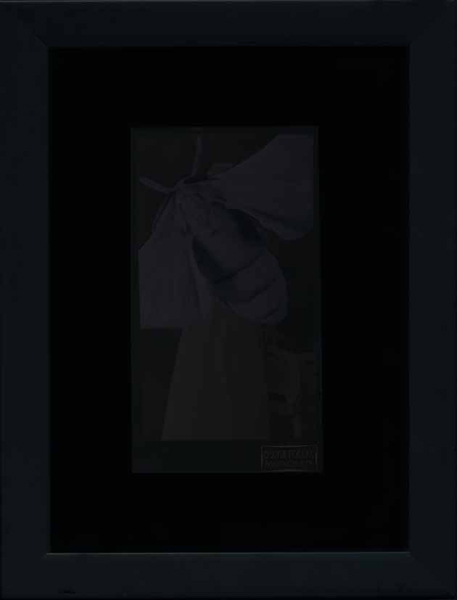
Atropos, 2010
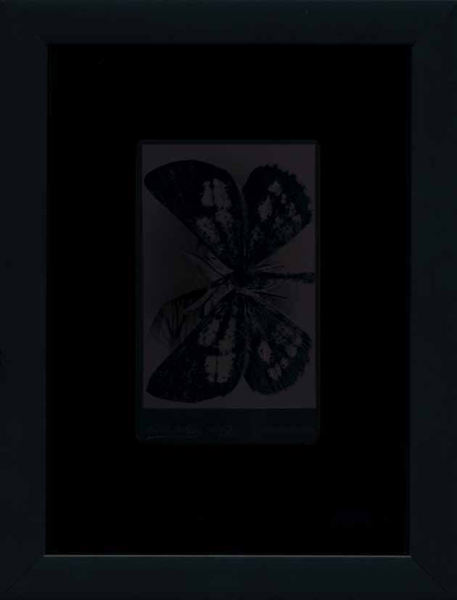
Atropos, 2010
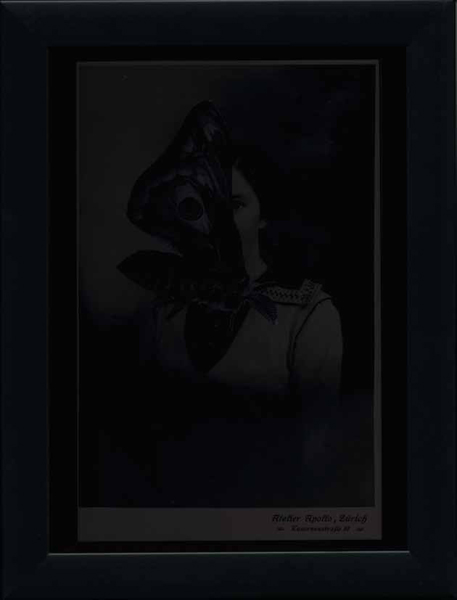
Atropos, 2010
Atropos, 2010
Group of works with 34 collages
Collage on found photograph (portrait), black wooden frame, dark grey acryl glass plate, approx. 16 x 21 cm each
Atropos (from Greek Aτροπος, the “Inevitable”) in Greek mythology is the oldest of the three Moirae. As a destructress it was her task to cut the thread of life, spun by her sister Clotho and measured by her other sister Lachesis. She chose the type of death of a human being. Due to its impressive appearance with the eponymous skull on its thorax the Death's-head Hawkmoth (Acherontia ATROPOS) has long been considered baneful (a harbinger of death). Even today it is used as a sign of evil. With “Atropos,” a goddess of fate from Greek mythology, its original descriptor Carolus Linnaeus already gave the species a scientific name tying in with this.
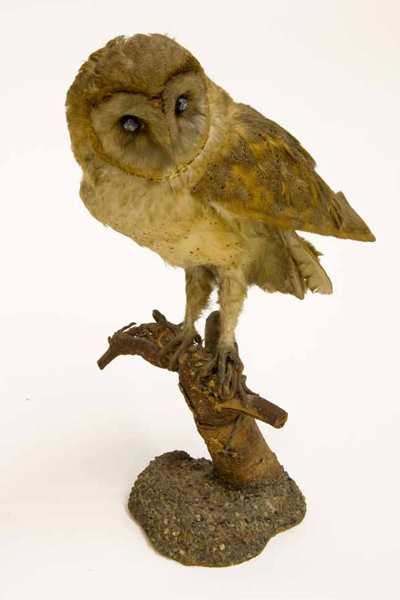
Im Angesicht des freien Willens (Face to face with free will), 2010
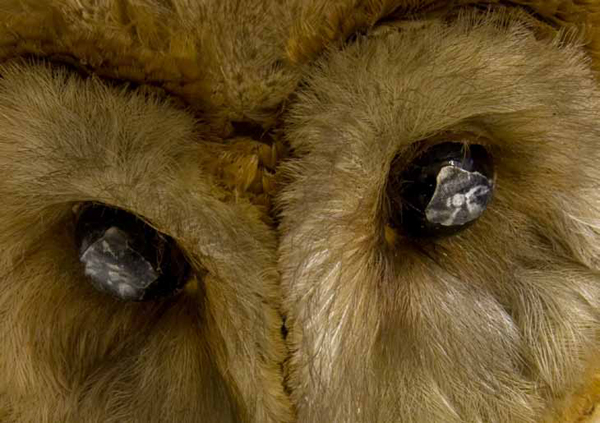
Im Angesicht des freien Willens (Face to face with free will), 2010
Face to face with free will, 2010
Mounted barn owl, collage on the eyes (2 creeping soldiers) approx. 40 x 30 x 20 cm
The Kantian Antinomy states that a human being must have a free will. Via the free will the human being decides whether to behave according to good or evil. Ideally, the free will coincides with the good will. A person acting on good will is always intent on doing good or at least intending good, regardless of whether this succeeds or not. The free will, along with the good will, is the greatest good for humans; without it, humans would be equal to animals.
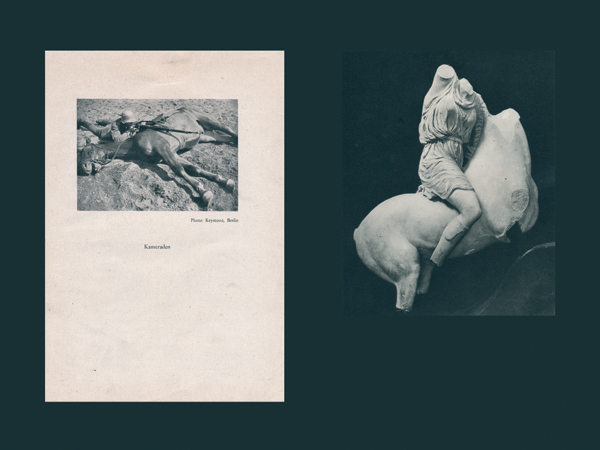
huber.huber: Kameraden (Comrades), 2009
Collage, 2 images mounted on black paper, 29 x 39 cm
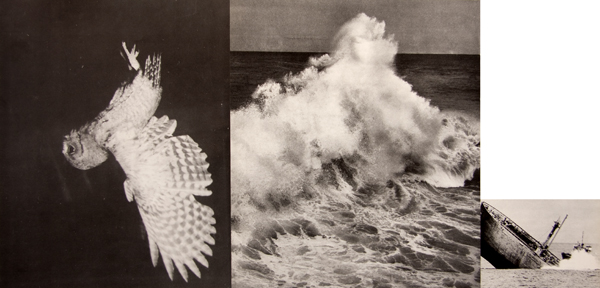
huber.huber: Sechstagewerk (Eule, Welle, Schiffsunglück) (Six-Day Work (Owl, Wave, Shipwreck))
huber.huber (Markus and Reto Huber)
Since they graduated from the University for Design and Art in Zurich (now ZHdK) in 2005, the twin brothers Markus and Reto Huber (*1975 Münsterlingen), have been working together under the label huber.huber.
Over the past years, huber.huber have attracted attention chiefly with their collages and drawings, but also with sculptural works and installations.
The main themes of their work circle around the ambivalent relation between civilization and nature. huber.huber deal with current social questions. Hope, fears, belief and the failure of humanity become a central topic. Their surprising juxtaposition and their special irony and oddity makes them convincing. In the putative idyll the abyss always lurks.
huber.huber's multilayered work has been shown in a variety of galleries and a number of group exhibitions in Switzerland and abroad. With „Vor der Vergangenheit“ (Before the Past) in 2008 the Kunsthaus Glarus dedicated the first sizable institutional solo exhibition to huber.huber. This was followed in 2009 with a further large solo exhibition under the title „I cani non hanno anima“ (Dogs Do Not Have A Soul) at the Cantonal Art Museum Lugano.
2005 they received a studio scholarship in New York by the Municipality of Zurich. 2006 they won the «Kulturpreis Julius Baer», 2007 the sponsorship aware of the UBS Culture Foundation. In 2009 they were nominated for the prestigious Vordemberge-Gildewart Preis.